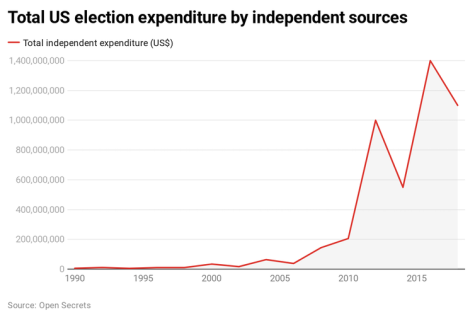The Shifting Role of Citizens United
March 28, 2022
“Citizens United v. Federal Elections Commission” is a landmark Supreme Court case that uncorked the cap on private donations to political campaigns. Here’s a challenge: guess the date the decision was made based on this OpenSecrets chart.

2010, good job! The decision itself was predicated on the First Amendment, indicating that donations, including political ones, are protected in the same manner that free speech and expression are. Where this intersects with bribery was not defined, or even acknowledged. An explosion of previously regulated private donations ensued, see above, and with them a new wave of bipartisan fervor for campaign finance reform, a docket still strong today.
The partisan divide in voter opinion is vanishingly small, but the gap between the practices of the partisan institutions, the parties and their advocates, is as large as anything else today. “Citizens United v. FEC” was decided by a conservative Supreme Court majority. Citizens United itself is a conservative advocacy group, and the origin of their case against the Federal Elections Commission was a dispute over their ability to air an attack ad on then-Democratic primary candidate Hillary Clinton. While Republican politicians do not make a habit of publicly airing support for the decision, they have ended attempts to draft legislation against the types of large donations it allows. One could assume, then, given this behavior, that large donors emboldened by “CU v. FEC” would prefer Republicans. This may have been an easy assumption at the time, and it was true, but things have changed since the Obama years.
Money in politics is a complex topic, and its role in electoral success is largely speculative. Lobbyists do exist, yes, and private donors do make contributions for favors. But nobody actually knows how much spending money improves a politician’s odds of winning, or if it even does, and obviously neither side wants to be the first to test it. One way to get closer to an answer is to look back at campaigns and see how much money the victor and loser spent. In 2020, Biden did outearn Trump. Biden’s campaign raised a little over $1 billion, and Trump’s about $773,000,000.
Joe Biden is not the only person to ever spend a billion dollars while trying to become the president, just the only successful one. Record-holder Michael Bloomberg spent his own $1.1 billion to come in fourth place in the 2020 Democratic primary, more than double the money spent by every podium finisher combined. He dropped the day after Super Tuesday, not winning a single state. Congress’ large numbers makes it easy to collect a lot of data, but also muddies the water. In 2020, the campaign that spent more money won in 88% of House races. But no competent party treasurer or lobbyist is going to direct funds towards candidates that are very unlikely to win, and uncompetitive candidates are common, the norm even, in congressional races.
So this paints a mixed picture. The concept that money can “buy” elections is clearly absurd, lest the people hail President Bloomberg. It is also plausible that more consequential, sensationalized national races are less affected by money than by the political climate of the moment, and that the role of money in politics is greater in smaller local elections. But in any case, it remains true that an overwhelming, bipartisan majority of Americans do not approve of the Citizens United decision and the money it brought.

